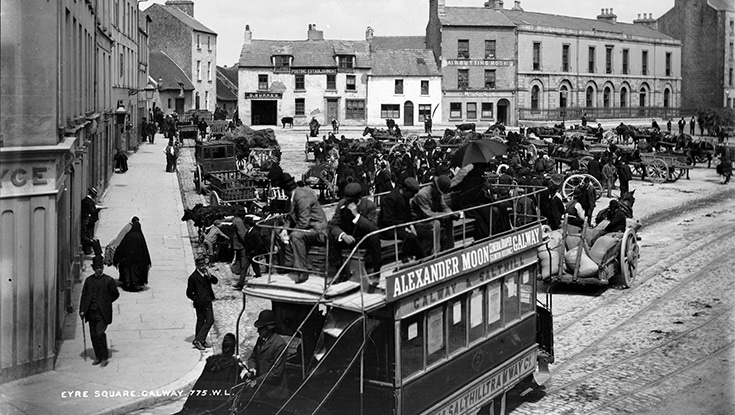NUI Galway’s Department of History in association with Galway City Council will host the inaugural Galway History Festival from 5-16 March. There will be a number of free talks, workshops and public events throughout the festival on campus and across the city with guests including Catherine Corless, Andy Irvine and many more.
Responses
Dr Kevin O’Sullivan, one of the festival co-organisers, from the Department of History at NUI Galway, said: “We are very excited about the festival – particularly its diverse mix of speakers, panellists, chefs, and musicians. Our aim when putting together the programme was to reflect the rich history of this city and its surrounding region, as well as celebrating the fact that Galway has always been an internationally-connected place. We look forward to some thought-provoking discussions and debates, and hope there will be something on the programme for people of all ages and interests – from the panel discussions to the community and school’s events.”
Mr Brendan McGrath, Chief Executive of Galway City Council, said: “Galway City Council is very pleased to be involved in the development of this significant new addition to our city’s cultural calendar. As part of our Creative Galway 2018 -2022 programme which receives funding from Creative Ireland, we are delighted to support the opportunity the Galway History Festival affords for a dynamic and accessible point of entry into Galway’s past for locals and visitors alike.”
Galway History Festival Details
The festival opening will be held in the Aula Maxima at NUI Galway on Thursday, 7 March, when Dr John Cunningham from the Department of History at NUI Galway will discuss the life of Tom Glynn (1881-1934) the son of a herdsman from Gurteen, Co. Galway, who became a notable radical journalist and anti-war campaigner in Australia. The talk will feature a performance by renowned Irish musician, Andy Irvine whose composition Gladiators was inspired by the work of Glynn and his friend Tom Barker.
Events
Galway has a long-standing reputation for its food. On Friday, 8 March at Galway City Museum, a panel that will include chef JP McMahon, Aniar and Cava, food historian Dr Regina Sexton, UCC, social historian Dr Ciara Breathnach, UL, and chef and food historian Áine Maguire, will trace the history of food in Galway and the West of Ireland from the eighteenth century to the present. The event will be held in Galway City Museum and Dr Sarah-Anne Buckley from NUI Galway will moderate the discussion.
On Saturday, 9 March, a series of discussions will be held in the Black Gate Cultural Centre. The panels begin at 10am, when Catherine Corless, who came to the public’s attention for her research into the death records at the Tuam Mother and Baby Home will deliver a talk with Irish Examiner journalist, Conall Ó Fathárta who has carried out research on Ireland’s institutional past, from Bessboro Mother and Baby Home to illegal adoptions. They will discuss their research with Dr Sarah-Anne Buckley who is working on the ‘Tuam Home Oral History Project’ at NUI Galway, which is recording and archiving the testimonies of people who spent time in the Mother and Baby Home in Tuam.
Panel Discussion
The Atlas of the Irish Revolution was the Bord Gáis Energy Book of the Year in 2017 and is the basis for the recent three-part series on RTÉ 1, ‘The Irish Revolution’. On Saturday, 9 March a panel, which includes two of the book’s editors, Dr Donal Ó Drisceoil and Dr John Borgonovo, UCC, will address the history of the Revolution in Galway, with contributions from Dr Tony Varley and Dara Folan from NUI Galway. The event will be moderated by Dr Mary Harris, NUI Galway.
Galway in the 1970’s was a period of great innovation in the arts and cultural spheres, alongside upsurges in social activism and political radicalism. On Saturday, 9 March three veterans of this period, Ollie Jennings, co-founder of Galway Arts Festival, Evelyn Stevens, Galway Family Planning Association, and Seosamh Ó Cuaig, Gluaiseacht Chearta Sibhialta na Gaeltachta will discuss their efforts during that decade, and will reflect on changes since then.
Debating History
On Saturday, 9 March, a panel which will include contributions from Dr Catríona Crowe, Archivist and Historian, and Dr Eoin Daly and Professor Niall Ó Dochartaigh from NUI Galway will debate what role history plays in twenty-first century society and politics. The panel will be moderated by Dr Kevin O’Sullivan, NUI Galway.
A series of ‘Shop’ events will take place on Saturday, 9 March with renowned Galway businesses Powell’s, The Four Corners, Ó Máille’s, McCambridge’s and Anthony Ryan’s, telling the stories of how their businesses came to be and the successes that have led them to remaining in business today. Colm Powell traces the evolution of the business acquired by his father almost a century ago, while also introducing the historic building in which it is located. Anne and Ger Ó Máille will tell the story of their family business which has been selling homespun yarns and made-to-measure clothing since 1938; Natalie McCambridge will talk about the development of the ‘high class grocery, provision, wine and spirit establishment’ established by her grandfather, George McCambridge in the 1920s and Anthony Ryan will outline the history of the drapery store established in 1909 by his grandparents, Anthony and Katherine.
Rich in Culture
Galway City is home to some of the most celebrated pubs in Ireland; with The Crane Bar being one of Galway’s longest established traditional music venues. Current owners, Mick Crehan and Maeve Joyce will talk about the history of their pub, and its role in Galway’s musical culture. Legend has it that Oliver Cromwell gifted the building today known as The King’s Head as payment for the execution of King Charles I. Join Tom Kenny from Kenny’s Bookshop and Gallery as he shares pictures and stories of Galway pubs.
In theatre, The story of The Little Fish: A Musical Journey will tell the story of the promising indie band that were ‘The Little Fish’ and their journey through Galway’s golden-age musical scene. Members of the band will be there on the day to play some of their songs while reminiscing about their experiences as an up and coming rock band.
St. Nicholas’s Collegiate Church is Galway’s most historic place of worship. Professor Steven Ellis from NUI Galway, and for many years a Churchwarden there, will give a short talk and answer questions on the history of St Nicholas’s and his association with its Anglican community since his arrival to Galway in the 1970s.
Community Impact
A variety of community events will also be held during the festival; Dr Pádraig Lenihan, NUI Galway will give a talk on ‘Aughrim and the Boyne compared’; Dr Kevin O’Sullivan and Dr Barry Houlihan from NUI Galway will give a workshop for leaving certificate students on ‘Quiz the Historians: Advice on putting together a Special Project’; Professor Dáibhí Ó Cróinín, NUI Galway will deliver a lecture on ‘The Real Saint Patrick’ and Dr Sarah-Anne Buckley and Dr Tomás Finn, NUI Galway will give a workshop to primary school pupils on ‘How to interview your Granny (Grandad, next-door neighbour, auntie, uncle)’.
For more information about Galway History Festival email [email protected], visit: https://galwayhistoryfestival.wordpress.com/ or follow on Twitter @historyatgalway












Remove outdated content from website